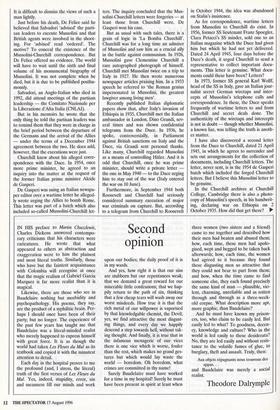Second opinion
IN HIS preface to Martin Chuzzlewit, Charles Dickens answered contempo- rary criticisms that his characters were caricatures. He wrote that what appeared to others as abstraction and exaggeration were to him the plainest and most literal truths. Similarly, those who have but the faintest acquaintance with Colombia will recognise at once that the magic realism of Gabriel Garcia Marquez is far more realist than it is magical.
Likewise, there are those who see in Baudelaire nothing but morbidity and psychopathology. His poems, they say, are the product of a syphilitic brain. Per- haps I should once have been of their party; but no longer. The experience of the past few years has taught me that Baudelaire was a literal-minded realist who merely happened to express himself with great force. It is as though the world had taken Les Fleurs du Mal as its textbook and copied it with the minutest attention to detail.
Each day in the hospital proves to me the profound (and, I stress, the literal) truth of the first verses of Les Fleurs du Mal. Yes, indeed, stupidity, error, sin and meanness fill our minds and work upon our bodies; the daily proof of it is in my wards.
And yes, how right it is that our sins are stubborn but our repentances weak; that we demand a great reward for our miserable little confessions; that we hap- pily return to the path of sin, thinking that a few cheap tears will wash away our worst misdeeds. How true it is that the rich metal of our willpower is vaporised by that knowledgable chemist, the Devil; yes, we find attractive the most disgust- ing things, and every day we happily descend a step towards hell, without tak- ing thought. And finally, it is true that in the infamous menagerie of our vices there is one vice which is worse, fouler than the rest, which makes no grand ges- tures but which would lay waste the world — boredom. Oh boredom, what crimes are committed in thy name!
Surely Baudelaire must have worked for a time in my hospital! Surely he must have been present in spirit at least when three women (two sisters and a friend) came to me together and described how their men had beaten and abused them; how, each time, these men had apolo- gised, wept and begged to be taken back afterwards; how, each time, the women had agreed to it because they found these disgusting men so attractive that they could not bear to part from them; and how, when the time came to find someone else, they each found precisely the same kind of man — plausible, vio- lent, charming, unreliable and as rotten through and through as a three-week- old corpse. What description more apt, more graphic, than Baudelaire?
And he must have known my prison- ers, too, who claim to be easily led. But easily led to what? To goodness, decen- cy, knowledge and culture? Who in the world is led easily to these desiderata? No, they are led easily and without resis- tance to the volatile fumes of glue, to burglary, theft and assault. Truly, then: Aux objets rdpugnants nous trouvons des aPPas. - -
and Baudelaire was merely a social realist.
Theodore Dalrymple


















































 Previous page
Previous page